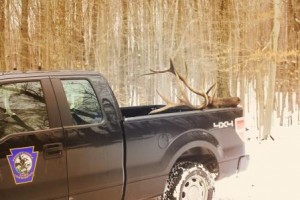
HARRISBURG – A trophy bull elk was found dead earlier this month on Pennsylvania’s elk range, the apparent victim of winter wildlife feeding, which is illegal for elk.
Test results returned last week cited rumen acidosis as causing the death of the 6- by 7-point bull found Jan. 9 in Byrnedale, Elk County. The disorder affects wild deer and elk, as well as domestic animals such as cattle and sheep, and in wild animals often is linked to supplemental feeding by humans.
Rumen acidosis is brought on by the sudden introduction of carbohydrates, usually grain and often corn, to an animal’s diet.
The diets of wild deer and elk vary by their home ranges, and often change throughout the year. Their bodies adjust to accommodate those changes, but if their diets change suddenly rather than gradually, their bodies are unable to digest the newly introduced food. If they eat enough of that food, it can kill them.
That appears to be what happened with the bull elk. An elk’s diet is made up mostly of grasses and other soft vegetation. When the bull suddenly overloaded on corn, its body produced too much lactic acid in an attempt to digest this new food, causing its death.
Though it’s not yet clear how the bull came in contact with the corn on which it fed, it’s likely the corn was placed intentionally by humans, perhaps because they believed their actions would help wildlife. The incident occurred just after a nasty cold snap, a time when concerned individuals begin to worry about the survivability of wildlife. As shown by this case, intentional feeding can have a counter effect of harming wildlife.
Additionally, the feeding of elk anywhere in Pennsylvania is illegal, meaning that if the bull’s death stems from intentional feeding, it also stems from an illegal act.
“Most times, the best way to help wildlife make it through the winter is to step back and allow the animals’ instincts to take over,” said Cal DuBrock, director of the Pennsylvania Game Commission’s Bureau of Wildlife Management. “In a natural setting, most wildlife will change their behaviors to adapt to colder temperatures and scarcer food supplies. Supplemental feeding can alter that behavior and have detrimental, and sometimes fatal, effects.
An investigation into the circumstances that led to bull’s death is ongoing. But the incident serves as a timely reminder on the law prohibiting the feeding of elk, as well as other concerns associated with the supplemental feeding of wildlife.
While the feeding of wildlife remains legal in many circumstances, there are some accompanying risks.
Supplemental feeding can cause animals to lose their natural fear of humans, which can cause problems for both the animals and other people. For this reason, it is unlawful to intentionally place any food or other substance that causes bears to congregate or habituate in an area. Bears that become habituated to humans often become nuisances, causing property damage and creating other problems.
Supplemental feeding also causes animals to concentrate at unnaturally high densities, increasing their risk of spreading disease to one another, giving predators an advantage and exposing them to other dangers they otherwise might not encounter.
Among other reasons, the supplemental feeding of elk remains unlawful because it can encourage the elk to spend more time near population centers where the potential for conflict with humans increases.
Those convicted of illegally feeding wildlife face penalties that could include hundreds of dollars in fines and court costs, and additional penalties could result if an animal dies because of illegal feeding.
Rumen acidosis can be caused by many foods other than corn. Wheat and barley also are commonly responsible for causing the disorder, while apples, grapes, bread and sugar beets can cause the disorder, but are less commonly involved. Animals severely afflicted by rumen acidosis typically die within 24 to 72 hours, but the disease might also shorten the lifespans of the animals that survive the disease.
DuBrock said he can appreciate people who want to help wildlife through the winter, but they can make a more beneficial contribution by improving wildlife habitat on their properties. Feeding often creates more problems than it solves, and some feeding activities are unlawful, he said.
“These are things to think about when placing out food for wildlife,” he said. “Those who want to help wildlife should also know about the potential for harm that could result from their actions.”
It is the official policy of the Pennsylvania Game Commission to not support the supplemental winter feeding of game birds or game animals.